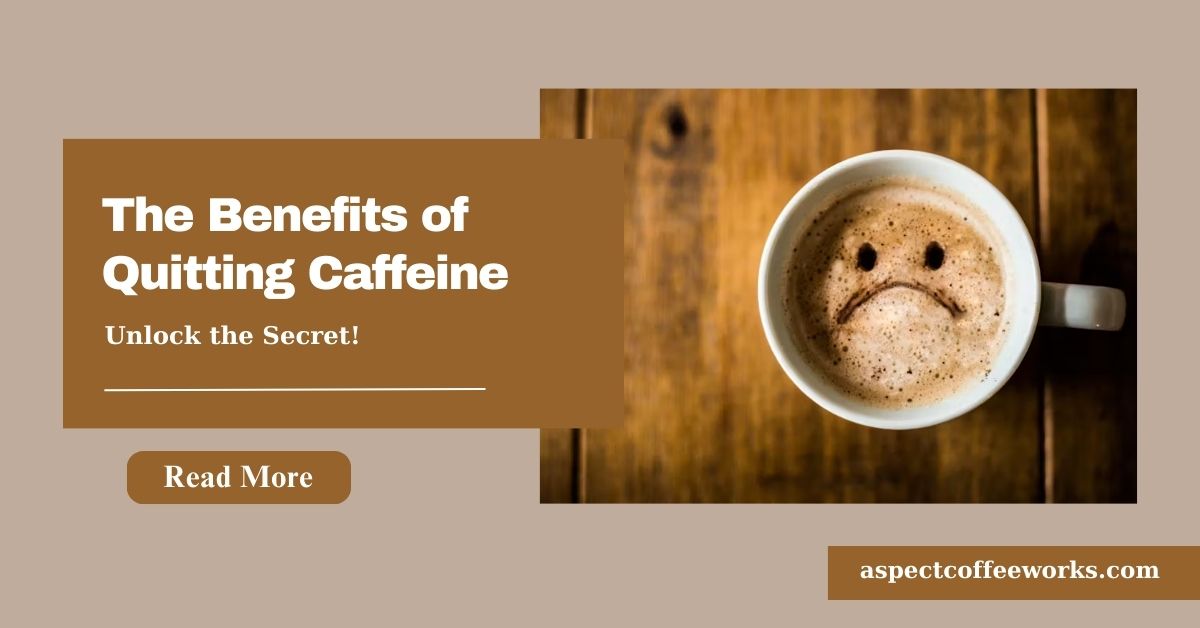The Benefits of Quitting Caffeine: Improved Health and Energy Levels
The benefits of quitting coffee are numerous and can have a significant impact on your overall health and well-being. As someone who used to consume multiple cups of coffee a day, I understand how difficult it can be to break the habit. However, after stopping coffee, I noticed several positive changes in my body, including improved sleep, reduced anxiety, and fewer headaches. In this article, Aspect Coffee Works will explore the benefits of quitting coffee.
Contents
- 1 Understanding Coffee and Its Effects
- 2 Immediate benefits of quitting caffeine
- 3 Long-Term Health Benefits if You Avoid Caffeine
- 4 Psychological and Emotional Benefits
- 5 Who should consider cutting or quitting caffeine?
- 6 Financial Benefits of Coffee-Free
- 7 Besides coffee, Which drinks contain caffeine?
- 8 Conclusion
Understanding Coffee and Its Effects

I’ve been a coffee drinker for years, and I know firsthand how difficult it can be to give up this beloved beverage. However, after doing some research, I discovered that there are many benefits to discontinuing coffee.
Coffee is an energizer that includes caffeine, a substance that can affect the body in several ways. For example, coffee extract can increase heart rate and blood pressure, which can be problematic for people with cardiovascular issues. Additionally, caffeine can interfere with sleep, making it harder to fall asleep and stay asleep throughout the night.
While coffee extract can provide a temporary energy boost, it can also cause crashes and lead to feelings of fatigue later on. This is because caffeine stimulates the production of adrenaline, which can cause the body to feel stressed and tired once the adrenaline wears off.
In addition to these effects, coffee can also be acidic and cause digestive issues in some people. This is because coffee contains chlorogenic acid, which can irritate the lining of the stomach and lead to heartburn, acid reflux, and other digestive problems.
Overall, while coffee can provide a temporary energy boost, it can also have negative effects on the body. By discontinuing coffee, you may be able to improve your sleep, reduce your risk of cardiovascular issues, and avoid digestive problems.
Immediate benefits of quitting caffeine

As someone who used to drink coffee regularly, I can attest to the fact that discontinuing caffeine can have immediate benefits. Here are three benefits that I experienced when I stopped coffee:
Better sleep
One of the most noticeable pros of stopping caffeine is better sleep. Caffeine is an energizer that can interfere with the body’s natural sleep cycle. When I gave up coffee, I found that I was able to fall asleep faster and stay asleep longer. This is because caffeine can disrupt the production of melatonin, a hormone that helps regulate sleep. By discontinuing caffeine, I was able to restore my body’s natural sleep cycle and get more restful sleep.
Reduced Anxiety Levels
Another pro of stopping caffeine is reduced anxiety levels. Coffee can increase the production of cortisol, a hormone that is associated with stress and anxiety. When I stopped coffee, I found that I was less anxious and more relaxed throughout the day. This is because caffeine can stimulate the nervous system and trigger the “fight or flight” response. By v coffee, I was able to reduce my overall stress levels and feel more calm and centered.
Balanced Hormone Levels
Finally, quitting coffee can also help balance hormone levels in the body. Caffeine can disrupt the production of estrogen and progesterone, two hormones that are essential for reproductive health. When I gave up coffee, I found that my menstrual cycle became more regular and my PMS symptoms improved. This is because coffee can disrupt the delicate balance of hormones in the body. By discontinuing coffee, I was able to restore this balance and improve my overall health.
In conclusion, discontinuing coffee can have immediate benefits for your health and well-being. By improving your sleep, reducing anxiety levels, and balancing hormone levels, you can feel better and more energized throughout the day. If you’re thinking about stopping coffee, I encourage you to give it a try and see how it can benefit you.
Long-Term Health Benefits if You Avoid Caffeine

Lower Risk of Heart Disease
One of the long-term health benefits of avoiding coffee is a lower risk of heart disease. According to a study published in the American Journal of Clinical Nutrition, coffee consumption may increase blood pressure and heart rate, leading to an increased risk of heart disease [1]. By cutting out caffeine, you can reduce your risk of developing heart disease, which is a leading cause of death worldwide.
Reduced Risk of Osteoporosis
Osteoporosis is a condition that causes bones to become weak and brittle, increasing the risk of fractures. According to a study published in the Journal of Bone and Mineral Research, caffeine intake may increase the risk of osteoporosis [2]. By avoiding coffee, you can reduce your risk of developing osteoporosis and maintain strong and healthy bones.
Prevention of Gastrointestinal Issues
Caffeine is known to stimulate the production of stomach acid, which can lead to gastrointestinal issues such as acid reflux, heartburn, and stomach ulcers. By reducing caffeine, you can prevent these issues and maintain a healthy digestive system. Additionally, caffeine can also cause diarrhea and dehydration, which can lead to further gastrointestinal problems.
Overall, cutting out caffeine can have significant long-term health benefits, including a lower risk of heart disease, reduced risk of osteoporosis, and prevention of gastrointestinal issues. By making the switch to caffeine-free alternatives, such as tisane or decaf coffee, you can enjoy the same great taste without compromising your health.
Psychological and Emotional Benefits

As someone who recently gave up coffee, I can attest to the psychological and emotional benefits that come with giving up this popular beverage. Here are a few of the benefits I’ve experienced:
Enhanced Mood Stability
One of the biggest pros of stopping coffee is the enhanced mood stability that comes with it. Caffeine is an energizer that can cause feelings of anxiety, jitters, irritability, and restlessness. By quitting coffee, I’ve noticed that I feel more calm and relaxed throughout the day. I’m less likely to experience the highs and lows that come with caffeine consumption, which has improved my overall mood and emotional well-being.
Improved Focus and Concentration
Another pro of stopping coffee is improved focus and concentration. While caffeine can give you a temporary boost of energy and mental clarity, it can also lead to crashes and difficulty focusing later on. Since giving up coffee, I’ve noticed that I’m able to stay focused for longer periods without feeling jittery or distracted. I’m able to work more efficiently and get more done in less time.
Increased Natural Energy Levels
Finally, discontinuing coffee has led to increased natural energy levels. While caffeine can give you a quick burst of energy, it can also leave you feeling drained and fatigued later on. By stopping coffee, I’ve found that I have more sustained energy throughout the day. I no longer experience the mid-afternoon crashes that I used to, and I’m able to stay productive and focused without relying on caffeine to get me through the day.
Overall, the psychological and emotional pros of stopping coffee are numerous. From enhanced mood stability to improved focus and concentration, giving up coffee can have a positive impact on your mental and emotional well-being.
Who should consider cutting or quitting caffeine?

As a professional, I believe that anyone who experiences negative effects from caffeine consumption should consider cutting or discontinuing coffee altogether. This includes individuals who have trouble sleeping, experience anxiety or jitters, or have high blood pressure.
Caffeine is a stimulant that can increase heart rate and blood pressure, which can be dangerous for individuals with pre-existing heart conditions. In addition, caffeine can exacerbate anxiety and panic disorders, leading to increased feelings of nervousness and restlessness.
For those who have trouble sleeping, caffeine can interfere with their ability to fall asleep and stay asleep. This can lead to daytime drowsiness, fatigue, and decreased productivity. Cutting or discontinuing coffee can improve sleep satisfaction and promote a more restful night’s sleep.
Furthermore, individuals who are pregnant or breastfeeding should be cautious about caffeine ingestion. High levels of caffeine also have been linked to low birth weight, premature birth, and other complications during pregnancy.
In summary, anyone who experiences the negative effects of caffeine should consider cutting or discontinuing coffee. This includes individuals with heart conditions, anxiety or panic disorders, trouble sleeping, and those who are pregnant or breastfeeding.
Financial Benefits of Coffee-Free

As a coffee lover, I understand that giving up coffee can be a difficult decision. However, there are several financial advantages of giving up coffee that may make the decision easier.
Save Money on Coffee
One of the most obvious financial pros of stopping coffee is that you will save money on coffee. According to MSN, the habit of consuming caffeine, especially from specialty coffee shops or through the purchase of vitality drinks, can be costly. By giving up coffee, you can save a considerable amount of money each month. You can use this money to pay off debt, invest, or save for a rainy day.
Lower Medical Bills
Discontinuing coffee can also help you save money on medical bills. Caffeine can cause several health problems, such as anxiety, insomnia, and high blood pressure. By giving up coffee, you can reduce your risk of developing these health problems and avoid the associated medical bills. According to Caffeine Informer, stopping coffee can lower your blood pressure and keep your heart from working as hard. This can lead to a reduction in medical bills related to cardiovascular diseases.
Reduce Dental Bills
Another financial advantage of stopping coffee is that you can reduce your dental bills. Coffee is known to stain tooth enamel and cause bad breath. By stopping coffee, you can reduce the risk of dental problems and avoid the associated dental bills. According to Well+Good, discontinuing coffee can also reduce the risk of acid erosion and tooth decay.
In conclusion, quitting coffee can have several financial benefits, including saving money on coffee, lowering medical bills, and reducing dental bills. These benefits can help you improve your financial health and achieve your financial goals.
Besides coffee, Which drinks contain caffeine?

As someone who is trying to stop coffee, it’s important to be aware of other drinks that include caffeine. Here are some common caffeinated drinks to watch out for:
Tea
Tea is a popular alternative to coffee, but many types of tea still include caffeine. Black, green tea, green, and oolong all include caffeine, although the amount varies depending on the type and brewing method. Tisane, such as chamomile or peppermint, does not include caffeine.
Energy Drinks
Energy drinks are notorious for their high caffeine content. Some energy drinks contain as much caffeine as a cup of coffee or even more. In addition to caffeine, energy drinks often contain other energizers like guarana or taurine, which can be dangerous in large amounts.
Soda
Soda might not seem like a likely source of caffeine, but many popular brands include caffeine. Cola drinks like Coke and Pepsi include caffeine, as do some fruit-flavored sodas like Mountain Dew. If you’re trying to avoid caffeine, it’s best to stick with caffeine-free sodas.
Chocolate
Chocolate is a sneaky source of caffeine. Dark chocolate contains more caffeine than milk chocolate, but even milk chocolate contains some caffeine. If you’re trying to give up coffee extract, it’s best to avoid chocolate altogether or stick to small amounts of milk chocolate.
Other Sources
Caffeine can also be found in some medications, like pain relievers or weight loss supplements. Be sure to read the labels of any medications you’re taking to see if they contain caffeine.
Overall, it’s important to be aware of the caffeine content in the drinks and foods you consume. By avoiding or limiting your intake of caffeinated drinks, you can reap the benefits of quitting coffee and improve your overall health and well-being.
Conclusion
In conclusion, discontinuing coffee can have numerous benefits for your health and well-being. From improved sleep quality to reduced anxiety, giving up caffeine can have a positive impact on your daily life.
It is important to note that discontinuing coffee can be challenging, especially if you are used to consuming caffeine regularly. However, with the right support and mindset, it is possible to successfully eliminate caffeine from your diet.
If you are considering discontinuing coffee, it may be helpful to gradually reduce your caffeine intake rather than discontinuing cold turkey. This can help to minimize any withdrawal symptoms and make the transition smoother.
Remember, everyone’s experience with discontinuing coffee will be different. It is important to listen to your body and do what feels best for you. If you are unsure about whether giving up coffee is right for you, speak to a healthcare professional for personalized advice.







